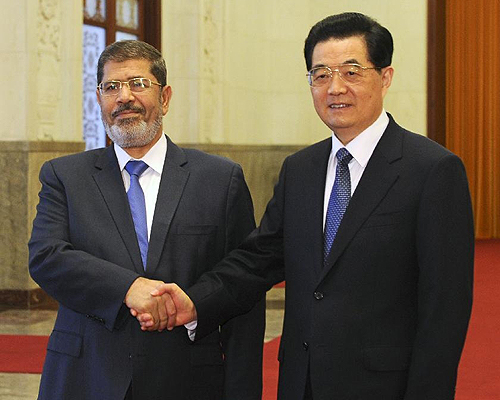|
 |
|
FIRST VISIT TO CHINA: Chinese President Hu Jintao welcomes visiting Egyptian President Mohamed Morsi in Beijing on August 28 (CFP) |
Mohamed Morsi, newly elected Egyptian President, launched an extensive diplomatic campaign shortly after taking office in June. Following trips to Saudi Arabia and Ethiopia, he visited China in late August before flying to Iran. He is also scheduled to pay a visit to the United States in September. These overseas trips reflect the Morsi administration's diplomatic strategy, which is to realize Egypt's maximized interests by implementing a balanced diplomatic policy.
Morsi kicked off his trip to China on August 28, in the president's first trip outside Africa and the Middle East. Observers noted that Morsi's choice underscored the value Egypt places on its relationship with China, especially as it looks to promote an economic recovery. At the same time, building a strong relationship with Egypt will put China in a better position to get involved in the peace process in the Middle East.
Morsi came to China with a host of political, economic and diplomatic tasks.
Politically, he hoped to follow Egypt's tradition of friendship with China. Egypt set up diplomatic relations with China in 1956, and was the first country in the Middle East and Africa to do so. In 1999, Egypt built a strategic cooperative relationship with China—another first in the region. When speaking with Chinese President Hu Jintao, Morsi said Egypt will maintain high-level exchanges with China and promote links between governments and political parties.
Another important reason Morsi came to China was his country's current economic troubles. Now that Egypt, a long-time leader in the Arab world, has risen out of last year's bloody social unrest, the most pressing challenge for Morsi and his government is to revive the country's stagnant economy.
"Everything is undone now in Egypt. But Morsi's top challenge is still the country's economic recovery," said He Wenping, a senior research fellow with the Chinese Academy of Social Sciences (CASS). She pointed out that Egypt's economy has slowed due to social instability in the past year. The country's tourism sector is far from reviving, and the unemployment rate is more than 20 percent.
He Wenping pointed out that the latest statistics showed that about 40 percent of Egyptian people are living below the poverty line. To keep prices under control, the Egyptian Government has adopted a subsidy policy, causing a huge budget deficit. "Egypt now needs international development assistance and foreign investment," she said. "Trade between China and Egypt hasn't been influenced very much by the turmoil in the Middle East, so Egypt hopes to enlarge its exports to China while attracting investment from China." Bilateral trade rose to $8.8 billion last year, up nearly 30 percent year on year.
The visiting president also said Egypt hopes to expand its political cooperation with China as well as economic cooperation in areas such as manufacturing, agriculture, fishery, finance, electronics, communications and transportation infrastructure. Morsi was accompanied by a group of Egyptian business leaders on his trip to China, and the two countries signed a series of cooperation agreements.
Morsi invited Chinese companies to invest in Egypt and vowed to create a safe and stable environment for the enterprises. He called on the two countries to promote exchanges in civil aviation, tourism, education and technology. Egypt expects China to increase its total investment in Egypt from the current $500 million to $2 billion in three years.
Another target of Morsi's trip was to strengthen communication with China in terms of the regional situation. Qu Xing, President of the China Institute of International Studies (CIIS), said the turmoil in the past year has weakened Egypt's reigning influence in the Arab world. To inspire Egypt's all-around revival, Morsi must regain the country's decisive position on regional hotspot issues, such as the Syria issue. "Egypt can further communicate with China on Middle East developments, and it can also form a solid basis for expanded cooperation with China," said Qu, stressing China's opportunity to play a constructive role in the region.
While meeting President Hu, Morsi said Egypt appreciates and respects China's position on major international and regional issues. He said Egypt is ready to strengthen communication and coordination with China and cope with challenges through joint efforts. He also promised that Egypt will play a positive role in the development of Sino-Arab relations and Sino-African relations.
| 